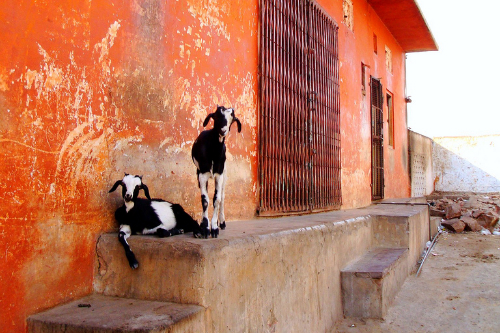
India can be cheap to travel through but it can also be expensive: Many palaces in the state of Rajasthan near Jaipur have been converted into so-called “7-star hotels,” which are in fact among the most expensive lodging in the world.
Unless you are want to drop a boat load of cash in India, your daily travel expenditures will remain very low. If you really want to, you can survive in India on around 20 U.S. dollars per day and quite well on $50.
But prices aren’t what bankrupts people when they travel in India — scams are. I should know: I fell victim to a pretty awful one.
Like most other people who travel to India, my friend Dora and I were eager to see the Taj Mahal. And since Agra is just a few hours from New Delhi, we headed immediately to the New Delhi Railway Station upon landing at the airport.
“Stop!” A poorly-groomed man standing to the left of the station entrance began approaching us. “I need to see your tickets.”
“He’s a con artist.” I rolled my eyes and place my hand on Dora’s shoulder. “Let’s keep walking.”
I put my hand out to stop the man from getting closer. “We’re buying them inside, thanks.”
Dora wasn’t convinced. “What if the ticket booth is outside?”
Neither was the man. “You must buy your tickets before going inside.”
“I’m sorry, Sir.” I felt ridiculous addressing the obvious fraud in such a respectful manner. “But I can see the ticket booth inside, and we’re going to buy them there.
“And besides, do you even work here?”
He shuffled through his pockets, and pulled out an un-laminated ID card that may or may not have had his picture on it. “Do not question me!” He roared, and got relatively far up in my face.
“Your train is sold out.” He motioned for us to come with him. “But if you follow me to the National Railway Office, we might be able to get you tickets.”
Dora whispered to me. “How does he know which train we want to take?”
“He doesn’t.” I turned back to the man. “Try it on someone else, dude. You don’t even know which train we want to take!”
He smiled slyly. “The 7:30 departure to Agra, right?”
“I think we should follow him,” Dora said, squeezing my hand. “I’d feel scared not to.”
Reluctantly — I knew the man was up to no good, but Dora wasn’t budging — I agreed that we could go with him.
Not surprisingly, the “National Railway Office” was little more than a shack on a street of shacks with a hand-drawn sign hanging above the door. And it was almost 10 minutes by foot from the actual railway station.
Even less surprisingly, the so-called “railway office” refused to sell us railway tickets. “They’re all sold out,” the even sketchier man behind the desk told us, while pointing to a website that was obviously not in any way related to Indian trains. He pointed to his watch. “And besides, your train has already departed.”
The good news, according to Sir Sketch-a-Lot, was that he had a “luxury” taxi-hotel package for us, which would allow us to see the Taj Mahal and Agra’s other tourist attractions according to the timetable we’d set, all in posh comfort.
The bad news — you know, beyond the fact that we were sitting in a cockroach-infested “office” as the train we’d planned to take was leaving the station — was the cost: 8,000 rupees or almost more than 10 times what we would have paid for our train tickets.
Thankfully, this was the only scam that befell Dora and I when we traveled in India. We’d been lucky prior to that point; and were so defensive afterwards that people didn’t bother trying.
The lesson here is two-fold: In general, do not go against your instinct with traveling; and in India, do not speak to or even acknowledge anyone who approaches you in public.
India is a very cheap place to travel, but if you fall victim to more than one scam — every India traveler is entitled to one scam — you will leave broke.

Robert Schrader is a travel writer and photographer who’s been roaming the world independently since 2005, writing for publications such as “CNNGo” and “Shanghaiist” along the way. His blog, Leave Your Daily Hell, provides a mix of travel advice, destination guides and personal essays covering the more esoteric aspects of life as a traveler.








